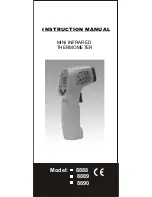
GB
6. General information on ... / 7. Notes regarding the ...
14030069.01 12/2011 GB/D/F/E
WIKA operating instructions models TR10-W, TC10-W
11
■
The temperature resistance of the connecting cable must comply with the
allowed operating temperature range. For ambient temperatures higher than
60 °C, heat-resistant connecting cables must be used.
■
No batteries may be mounted in the flameproof housings.
■
No capacitors which, after the time required for opening the housing, still have
a remaining energy of ≥ 0.02 mJ may be fitted within the flameproof housings.
The housing must not be opened during operation. After switching off the
operating voltage, wait 2 minutes before opening the housing.
■
Installation in metal containers:
The housing must be grounded against electromagnetic fields and
electrostatic discharge. A separate connection to the equipotential bonding
system is not required. A fixed and secure contact between the metallic
thermowell and the metallic container, its structural parts or pipes is sufficient
if these components are connected to an equipotential bonding system.
■
Installation in non-metallic containers:
All electrically conducting thermometer components which protrude into the
hazardous area must be provided with equipotential bonding.
■
Repairs or structural modifications are not allowed and will result in the
invalidation of the guarantee and the respective approval.
■
The manufacturer cannot be held liable for structural modifications after the
delivery of the devices.
7. Notes regarding the safety for the different versions
7.1 Version 1:
ATEX/IECEx Ex-d housing or connection head (with terminals, without
transmitter). Signal processing of the resistance or the thermoelectric voltage by
electronics outside the area.
7.1.1 Use in zone 1, certification II 2G Ex d IIC T1-T6 Gb
The flameproof housing or connection head is located in zone 1 (or zone 2). The
sensor is inside a thermowell (made of corrosion-resistant steel, wall thickness at
least 1 mm) which extends into the zone 1 via a process connection.
In this case, no power limitation is required since no possible source of error is
applied for the evaluation electronics.












































